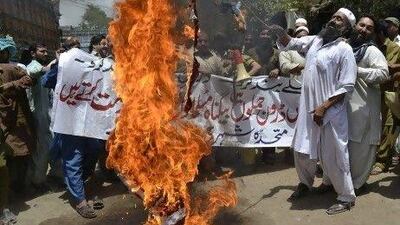PESHAWAR, PAKISTAN // Pakistani authorities have sentenced a doctor who allegedly helped the CIA find Osama bin Laden to 33 years in jail on charges of treason, a move almost certain to further strain ties between Washington and Islamabad.
Shakil Afridi was accused of running a fake vaccination campaign, in which he collected DNA samples, which is believed to have helped the American intelligence agency track down bin Laden in a Pakistani town.
The Al Qaeda leader was killed in a unilateral US special forces raid in Abbottabad in May last year.
"Dr Shakil has been sentenced to 33 years imprisonment and a fine of 320,000 Pakistani rupees [Dh12,800]," said Mohammed Nasir, a government official in Peshawar, where the jail term will be served.
Afridi is the first person to be sentenced by Pakistani authorities in the bin Laden case. No one has yet been charged for helping the Al Qaeda leader take refuge in Pakistan.
The imprisonment will almost certainly anger the US at a sensitive time, with both sides engaged in difficult talks about reopening Nato supply routes to US-led troops in Afghanistan.
US officials had made public appeals for Pakistan, a recipient of billions of dollars in American aid, to release Afridi, detained after the operation that killed bin Laden.
In January, Leon Panetta, the US defence secretary, said Afridi and his team had been key in finding bin Laden, describing him as helpful and insisting the doctor had not committed treason or harmed Pakistan.
Dana Rohrabacher, a US congressman, introduced legislation in February calling for Afridi to be granted American citizenship and said it was "shameful and unforgivable that our supposed allies" charged him.
The US raid that killed bin Laden in Abbottabad, just a few hours' drive from the capital Islamabad, humiliated Pakistan's military, which described the move as a violation of sovereignty.
Intelligence cooperation between the US and Pakistan, vital for the fight against militants, has subsequently been cut drastically.
Afridi's prison term could complicate efforts to break a deadlock in talks over the reopening of land routes through Pakistan to Afghanistan.
Pakistan closed the supply routes, also seen as vital to the planned withdrawal of most foreign troops from Afghanistan before the end of 2014, in protest against last November's killing of 24 Pakistani soldiers in a Nato air attack along the Afghan border.
Before Afridi's sentence, a US official said that the US hoped Pakistan would soon agree to reopen the routes after a Senate panel threatened to cut aid to Islamabad.
"Talks are continuing and we hope to reach a resolution soon," said the official.
Nato has been seeking to compensate for the lack of access in Pakistan with shipments of war supplies via Afghanistan's other borders, but those routes are more expensive.
A western official said fees for use of the routes are under discussion.
A US Senate panel voted to cut aid to Pakistan on Tuesday and threatened to withhold even more cash if the country did not reopen the routes.
The panel voted to cut aid by 58 per cent in the 2013 fiscal year, said the panel's chairman, Patrick Leahy.
That move, along with Afridi's case, highlighted tensions between Pakistan and the US.
Afridi was arrested soon after bin Laden was killed, and has not been publicly heard of since.
Seventeen health workers who worked with Afridi on the vaccination drive were fired in March, according to termination letters, which described them as having acted "against the national interest".
On May 2, one year after bin Laden's death, some of them appeared at the site where bin Laden's house had stood before it was demolished by Pakistani authorities.
Afridi "was very nice to all the people in the team and did his job very diligently", said one of the health workers Naseem Bib, holding one of the notices.
"Yes he was very interested in this house on that day [of the vaccination drive] but I am not sure why."
The sackings underscored Pakistan's lingering fury over the bin Laden affair, which exposed the military to rare public criticism, both because of the presence of the Al Qaeda chief in the country, and the fact that US special forces just swept in and out of the country and faced no resistance.

